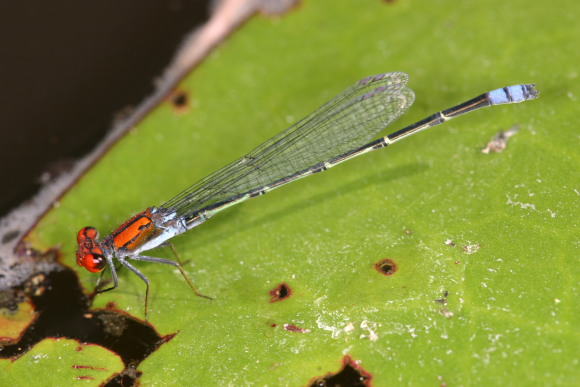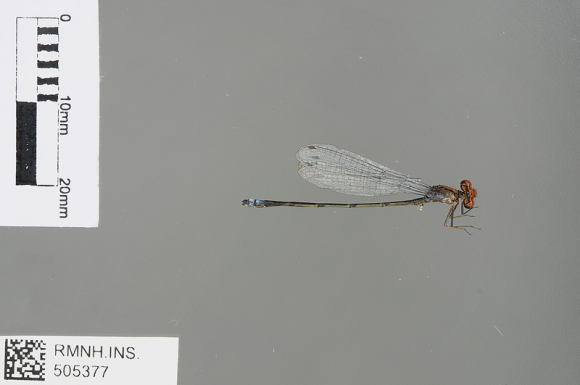Pseudagrion (B) massaicum Sjöstedt, 1909
Masai Sprite
Type locality: Kilimanjaro, Tanzania
Diagnosis
Male is similar to P. tanganyicum by (a) thorax brightly coloured, antehumeral stripe bright red or green, sides of thorax blue or green; (b) at least tibiae pale, contrasting with femora when these are dark; (c) S8-9 both usually distinctly marked with black apically, sometimes pruinose; (d) lateral and apical lobes of penis pointed; (e) cerci and paraprocts about equally long; (f) paraprocts hatchet-shaped, with prominent dorsal knob (lateral view) and short, blunt apex (lateral and dorsal view). However, differs by (1) ranging from Ethiopia to South Africa and Namibia; (2) face and antehumeral stripe red rather than being yellow and green respectively. [Adapted from Dijkstra & Clausnitzer 2014; this diagnosis not yet verified by author]
Habitat description
Standing and probably often temporary waters, as well as rivers, streams and possibly large lakes, in open landscapes. Often with emergent and aquatic vegetation, in streams probably especially at pools. From 0 to 2000 m above sea level, but mostly below 1700.
Distribution

Male © Jens Kipping
 Appendages (dorsal view) |
 Appendages (lateral view) |
 Penis (lateral view) |
Map citation: Clausnitzer, V., K.-D.B. Dijkstra, R. Koch, J.-P. Boudot, W.R.T. Darwall, J. Kipping, B. Samraoui, M.J. Samways, J.P. Simaika & F. Suhling, 2012. Focus on African Freshwaters: hotspots of dragonfly diversity and conservation concern. Frontiers in Ecology and the Environment 10: 129-134.
Barcode specimen(s):

Male; Democratic Republic of Congo, Katanga, © Dijkstra, K.-D.B.
References
- Sjöstedt, Y. (1909). Wissenschaftliche Ergebnisse der schwedischen zoologischen Expedition nach dem Kilimandjaro, dem Meru und den umgebenden Massaisteppen Deutsch-Ostafrikas 1905-1906 unter Leitung von Prof. Dr. Yngve Sjöstedt. 14. Pseudoneuroptera. 1. Odonata, 14, 1-52.
- Ris, F. (1921). The Odonata or Dragonflies of South Africa. Annals South African Museum, XVIII, 245-452. [PDF file]
- Longfield, C. (1936). Studies on African Odonata, with synonymy and descriptions of new species and subspecies. Transactions Royal Entomological Society London, 85, 467-498. [PDF file]
- Balinsky, B.I. (1961). Observations on the dragonfly fauna of the coastal region of Zululand, with descriptions of three new species (Odonata). Journal Entomological Society Southern Africa, 24, 72-91. [PDF file]
- Pinhey, E.C.G. (1961). Dragonflies (Odonata) of Central Africa. Occasional Papers Rhodes-Livingstone Museum, 14, 1-97. [PDF file]
- Pinhey, E.C.G. (1966). Check-list of dragonflies (Odonata) from Malawi, with description of a new Teinobasis Kirby. Arnoldia, 2, 1-24. [PDF file]
- Barnard, K.H. (1937). Notes on dragon-flies (Odonata) of the S. W. Cape with descriptions of the nymphs and of new species. Annals South African Museum, 32, 169-260. [PDF file]
- Pinhey, E.C.G. (1973). Notes on some African representatives of the genus Pseudagrion Selys, 1876, with descriptions of two new species (Zygoptera: Coenagrionidae). Odonatologica, 2, 317-327. [PDF file]
- Ris, F., and Schmidt, E. (1936). Die Pseudagrion-Arten des kontinentalen Afrika. (Insecta, Odonata). Abhandlungen Senckenbergischen Naturforschenden Gesellschaft, 433, 1-68. [PDF file]
- Pinhey, E.C.G. (1967) Odonata Zygoptera. Exploration Hydrobiologique Bassin Lac Bangweolo Luapula, 14, 1-43. [PDF file]
- Chutter, F.M. (1962). A new species of Pseudagrion (Odonata: Zygoptera) with descriptions of the larvae of five other species belonging to the genus. Revista Biologia, 3, 171-198. [PDF file]
Citation: Dijkstra, K.-D.B (editor). African Dragonflies and Damselflies Online. http://addo.adu.org.za/ [2024-07-27].

